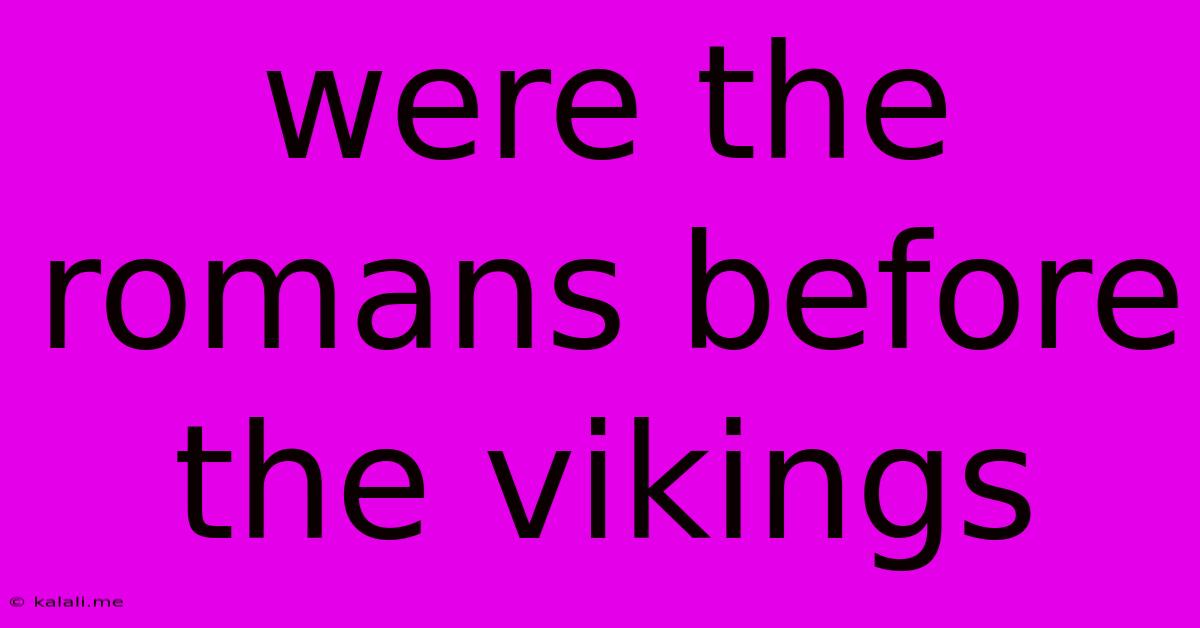Were The Romans Before The Vikings
Kalali
May 21, 2025 · 3 min read

Table of Contents
Were the Romans Before the Vikings? A Look at the Chronological Order of Two Great Civilizations
The Roman Empire and the Viking Age are two iconic periods in European history, each leaving behind a rich tapestry of legacy, from architectural marvels to intricate social structures. But when did these powerful civilizations exist in relation to each other? The simple answer is yes, the Roman Empire existed long before the Viking Age. This article will delve into the timelines of these two distinct eras, exploring their overlapping periods and contrasting legacies.
The Roman Empire, a civilization known for its military prowess, vast infrastructure, and lasting impact on law and language, reached its peak during the Pax Romana, a period of relative peace and prosperity spanning from 27 BC to 180 AD. While the Western Roman Empire eventually fell in 476 AD, the Eastern Roman Empire, also known as the Byzantine Empire, continued for another thousand years. This extended presence showcases the immense longevity and influence of Roman civilization.
The Viking Age, a period characterized by Norse seafaring explorations, raids, and trade, spanned roughly from the late 8th century to the mid-11th century AD (approximately 793-1066 AD). This period saw Vikings sailing across vast distances, establishing settlements in various parts of Europe, including England, France, and even parts of Russia and North America. Their impact on European history is undeniable, shaping political landscapes and leaving their mark on language and culture.
Key Differences in Timeline and Dominance
To understand the chronological separation clearly, consider these key points:
- Roman Empire's Peak: The Roman Empire's peak power and influence occurred centuries before the Vikings even began their major expansions. The Western Roman Empire's fall predates the start of the Viking Age.
- Geographic Focus: While both empires had significant geographical reach, their spheres of influence were primarily different. The Roman Empire dominated the Mediterranean world, while the Vikings primarily focused on northern and western Europe, raiding coastal areas and establishing settlements.
- Cultural Impact: The Roman Empire's influence on law, language, architecture, and political systems is deeply ingrained in many European societies. The Vikings, while impacting language and settlement patterns, had a less widespread and long-lasting cultural impact in the same manner.
Overlapping Influences: The Legacy of Rome on the Vikings
Despite the chronological gap, there's evidence suggesting some indirect influence of the Roman Empire on the Vikings. The Vikings inherited aspects of Roman technology and culture through their interactions with other post-Roman societies. For example, some Viking weaponry and metalworking techniques show traces of Roman influence. This, however, is more a matter of indirect, filtered transmission rather than direct contact. The Vikings largely encountered the fading remnants of the Roman world, not the empire in its prime.
In conclusion, the Roman Empire significantly predates the Viking Age. While there is some evidence of indirect cultural transmission, the two civilizations existed in distinct eras, each leaving its unique and indelible mark on the course of European history. Understanding their separate timelines allows for a more nuanced appreciation of their respective contributions to the world.
Latest Posts
Latest Posts
-
File Format Is Not Supported Whatsapp
May 22, 2025
-
How To Get Super Glue Off My Glasses
May 22, 2025
-
Cards Write Protect Switch Is Set To Lock
May 22, 2025
-
How To Stop Brakes From Squeaking Bike
May 22, 2025
-
How To Get Tarmac Off Clothes
May 22, 2025
Related Post
Thank you for visiting our website which covers about Were The Romans Before The Vikings . We hope the information provided has been useful to you. Feel free to contact us if you have any questions or need further assistance. See you next time and don't miss to bookmark.